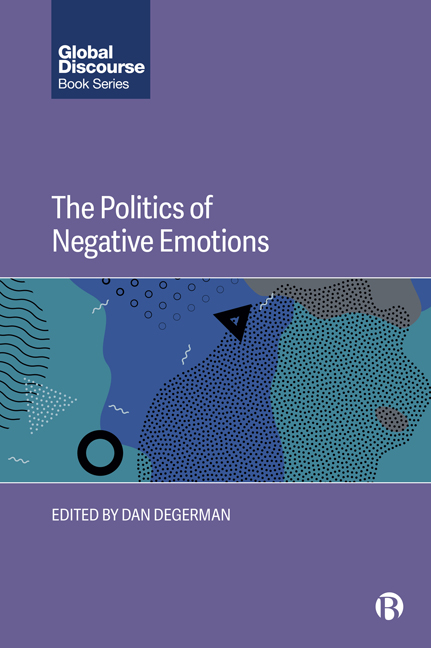Book contents
- Frontmatter
- Contents
- List of Figures
- Notes on Contributors
- Introduction: Feeling Our Way through Politics
- 1 Anger, Fast and Slow: Mediations of Justice and Violence in the Age of Populism
- 2 ‘We Will March Side by Side and Demand a Bigger Table’: Anger as Dignity Claim
- 3 Moving between Frustration and Anger
- 4 The Resentment– Ressentiment Complex: A Critique of Liberal Discourse
- 5 Green Shame: The Next Moral Revolution?
- 6 Against Comfort: Political Implications of Evading Discomfort
- 7 For Love and for Life: Emotional Dynamics at the World Congress of Families
- 8 The Functionality of Affects: Conceptualising Far-Right Populist Politics beyond Negative Emotions
- 9 Moral Economies of Exclusion: Politics of Fear through Antagonistic Anonymity
- 10 Contesting the Politics of Negative Emotions in Educational Policy Making: A Ban on Asylum Seekers’ School Visits in Finland
- Index
9 - Moral Economies of Exclusion: Politics of Fear through Antagonistic Anonymity
Published online by Cambridge University Press: 18 January 2024
- Frontmatter
- Contents
- List of Figures
- Notes on Contributors
- Introduction: Feeling Our Way through Politics
- 1 Anger, Fast and Slow: Mediations of Justice and Violence in the Age of Populism
- 2 ‘We Will March Side by Side and Demand a Bigger Table’: Anger as Dignity Claim
- 3 Moving between Frustration and Anger
- 4 The Resentment– Ressentiment Complex: A Critique of Liberal Discourse
- 5 Green Shame: The Next Moral Revolution?
- 6 Against Comfort: Political Implications of Evading Discomfort
- 7 For Love and for Life: Emotional Dynamics at the World Congress of Families
- 8 The Functionality of Affects: Conceptualising Far-Right Populist Politics beyond Negative Emotions
- 9 Moral Economies of Exclusion: Politics of Fear through Antagonistic Anonymity
- 10 Contesting the Politics of Negative Emotions in Educational Policy Making: A Ban on Asylum Seekers’ School Visits in Finland
- Index
Summary
Introduction
This chapter examines three interlinked publications by the Norwegian extreme-right civil society organisation Human Rights Service (HRS), to explore how illiberal political logics are legitimised through discursive technologies of xenophobic populism against Muslims and Islam. Hosting a widely distributed (primarily via Facebook) social media platform, HRS lends itself as an important case to examine how forms of far/extreme-right political persuasion are manufactured and increasingly pushed from the outer fringes to enter the mainstream of Norwegian public/political debate through circulation of digital demagogy. I focus here on unwinding some of the threads within ongoing developments of Norwegian anti-Muslim illiberalism that I suggest are of particular significance, namely the organised manufacture and circulation of what I term ‘fear appeals’. Illustrative of the type of conflict performance that I am interested in examining, the HRS recently published a commentary stating that:
This is the unpleasant truth. Islamists are known for their use of terror and other forms of violence across the world in the places where Islam sprouts and grows … all attempts to diminish or abolish a totalitarian political ideology disguised as religion (Islam) is a defence of democracy. It is allowed to defend one's own country against foreign-hostile attacks like Islamism. (HRS, 2018a)
To track the semiotic conditions under which ‘fear appeals’ are systematically enabled and circulated against Islam/Muslims in Norway via HRS publications, I draw on Ernesto Laclau and Chantal Mouffe's (2001[1985]) discourse theory and on Sara Ahmed's (2004) The Cultural Politics of Emotions. Herein, I examine three HRS articles published online during 2017– 18 (henceforth referred to as ‘the photo case’) and the formal properties of the HRS webpage from which articles have been disseminated. My argument falls along three main lines. First, I unpack the HRS webpage as a meta-discursive framework to discuss how the embedment of a distinct liberal democratic and human rights agenda serves as an ideological basis for sanctioning anti-Muslim, illiberal political logics of exclusion. Second, I analyse the textual content of the photo case, which frames several secretly taken photos of Norwegian Muslims.
- Type
- Chapter
- Information
- The Politics of Negative Emotions , pp. 177 - 199Publisher: Bristol University PressPrint publication year: 2023



